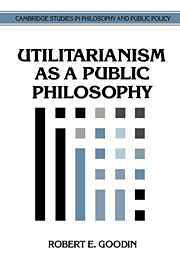Book contents
- Frontmatter
- Contents
- Preface
- Acknowledgments
- PART I INTRODUCTION: MORAL BASES OF STATE ACTION
- PART II MORALITY, PUBLIC AND PRIVATE
- PART III SHAPING PRIVATE CONDUCT
- PART IV SHAPING PUBLIC POLICIES
- 8 Liberalism and the best-judge principle
- 9 Laundering preferences
- 10 Heroic measures and false hopes
- 11 Theories of compensation
- 12 Stabilizing expectations
- 13 Compensation and redistribution
- 14 Basic income
- 15 Relative needs
- 16 What is so special about our fellow countrymen?
- 17 Nuclear disarmament as a moral certainty
- 18 International ethics and the environmental crisis
- References
- Name index
16 - What is so special about our fellow countrymen?
Published online by Cambridge University Press: 28 January 2010
- Frontmatter
- Contents
- Preface
- Acknowledgments
- PART I INTRODUCTION: MORAL BASES OF STATE ACTION
- PART II MORALITY, PUBLIC AND PRIVATE
- PART III SHAPING PRIVATE CONDUCT
- PART IV SHAPING PUBLIC POLICIES
- 8 Liberalism and the best-judge principle
- 9 Laundering preferences
- 10 Heroic measures and false hopes
- 11 Theories of compensation
- 12 Stabilizing expectations
- 13 Compensation and redistribution
- 14 Basic income
- 15 Relative needs
- 16 What is so special about our fellow countrymen?
- 17 Nuclear disarmament as a moral certainty
- 18 International ethics and the environmental crisis
- References
- Name index
Summary
There are some “general duties” that we have toward other people, merely because they are people. Over and above those, there are also some “special duties” that we have toward particular individuals because they stand in some special relation to us. Among those are standardly supposed to be special duties toward our families, our friends, our pupils, our patients. Also among them are standardly supposed to be special duties toward our fellow countrymen.
When reflecting upon what “special treatment” is due to those who stand in any of those special relations to us, ordinarily we imagine that to be especially good treatment. Close inspection of the case of compatriots reveals that this is not completely true, however. At least in some respects, we are obliged to be more scrupulous – not less – in our treatment of nonnationals than we are in our treatment of our compatriots.
Of course, it is a politically important result in itself to show that some of our general duties to those beyond our borders are sometimes more compelling, morally speaking, than some of our special duties to our fellow citizens. More to the point of the present book, this finding has the further effect of forcing us to reconsider the bases of our special duties to compatriots – with yet further political consequences. Morally, what ultimately matters is not nationality per se. It is instead some other feature that is only contingently and imperfectly associated with shared nationality.
- Type
- Chapter
- Information
- Utilitarianism as a Public Philosophy , pp. 263 - 287Publisher: Cambridge University PressPrint publication year: 1995
- 2
- Cited by



